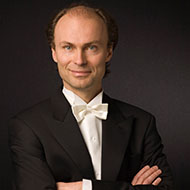At a Glance
IVES
For many, the mention of Charles Ives summons up the thought of an auditory riot, with more things going on than we can keep track of in a single sonic landscape. Not all of Ives is like that, though, as demonstrated in the two works being performed at these concerts.
Psalm 90 1890/1924 | 11 mins
Ives’s choral setting of Psalm 90 was composed—and recomposed—over a span of some thirty years. The piece is scored for mixed chorus, whose parts describe the measuring of human life against the infinity of time. The instrumental forces are covered by organ and optional bells and gong. The organ begins the piece on its own with a series of none-too-related chords. Above five of these chords, Ives inscribes ideas they symbolize: The Eternities, Creation, God’s wrath against sin, Prayer and Humility, and Rejoicing in Beauty and Work. After the last of the chords, three bells and a gong enter, marked “distant,” suggesting tolling church bells. DID YOU KNOW? The published score includes the note: “Mrs. Ives recalled [Charles] saying that it was the only one of his works that he was satisfied with.”
Symphony No. 3, The Camp Meeting 1912 | 19 mins
In 1911, Gustav Mahler, then-music director of the New York Philharmonic, happened to pick up a manuscript of Ives’ Third Symphony while in a New York copy shop. He was intrigued, but unfortunately died shortly thereafter and never conducted the piece. Mahler and Ives might seem an odd couple. But what Mahler saw in Ives was “a composer placing, as he did, the commonplace, the humble, the shopworn in a symphonic context, and in the process renewing both the material and the symphonic genre.” DID YOU KNOW? Symphony No. 3 earned Ives his Pulitzer Prize. It’s subtitled The Camp Meeting, and this evocation of a religious-social assembly in nineteenth-century America accordingly draws liberally on Protestant hymnody. It ends in fervent quietude and, like his Psalm 90, with the distant ringing of church bells.
DVOŘÁK
The American Flag 1893 | 21 mins
Antonín Dvořák rode the tide of musical nationalism that surged through the second half of the ninteenth century. But for three years, he left his beloved Bohemia to live in the United States, a country that also made a mark on a handful of his compositions. Among those works, his cantata The American Flag is the most overt in expressing patriotic fervor.
GERSWHIN
An American in Paris 1928 | 17 mins
This quintessentially American symphonic poem unfolds with radiant vitality and intoxicating energy. An American in Paris charts the adventures of an American tourist sampling the glories of Paris—and succumbing to fits of homesickness along the way. LISTEN FOR: The work’s most compelling features are its marvelous melodies—who isn’t enchanted by the central Blues section with its wailing trumpet solo?—and its glittering orchestration, featuring that quacking quartet of Parisian taxi horns.
Jeanette Yu is Director of Publications at the San Francisco Symphony.



